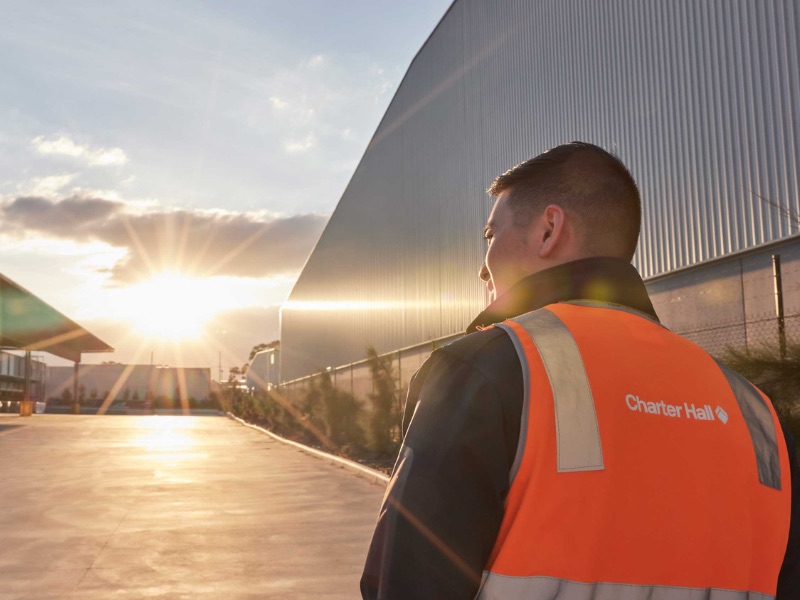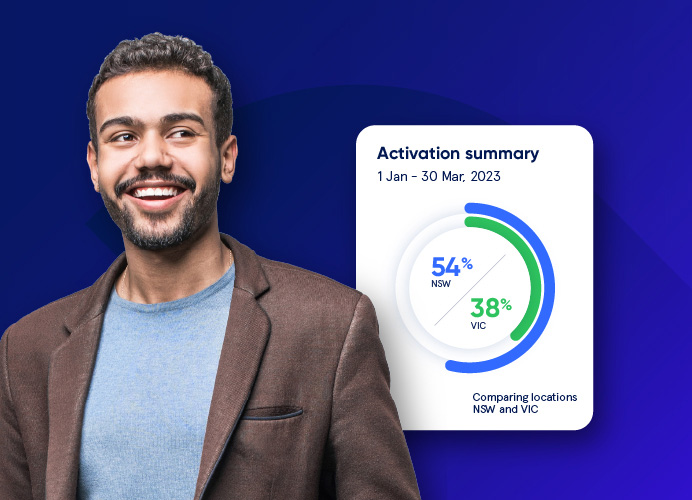Psychological health and safety in 2023: What’s changed?

Insights.
When ISO 45003 was released in June 2021 – as the first global standard that provided specific guidance on the management of psychosocial risks and the promotion of wellbeing at work in a manner consistent with other health and safety risks in the workplace – it offered a global blueprint for best practice but adherence was voluntary because it was a guidance standard not a requirements standard, with no official certification or compliance check.
Now, nearly two years on, with $904.9* million paid each year in compensation for work-related mental health conditions, local regulators are putting more rigour in place.
State and federal authorities have been gradually releasing their codes of practice, updating WHS regulations, and talking up the importance of psychological health and safety in the workplace. Pretty soon, all employers will either be subject to specific legislation, or answerable to a regulator who could rule that they were aware of best practice but chose to ignore it.
Any employers not already paying meaningful attention would be wise to step up their game – starting today.
* Safe Work Australia (2022, National Dataset for Compensation-Based Statistics, custom data request)
Jurisdictional duty in Australia
In May 2021, New South Wales implemented the Code of Practice: Managing psychosocial hazards at work. By doing so, they became the first Australia/New Zealand jurisdiction to implement an approved code of practice addressing psychosocial hazards. Western Australia (in February 2022), Tasmania (in January 2023) and Queensland (from 1 April 2023) have also introduced similar codes of practice in their respective jurisdictions. In July 2022, Safe Work Australia published their Code of Practice: Managing psychosocial hazards at work.
NSW became the first jurisdiction to adopt the amendments to the Model WHS Regulations. From 1 October 2022, PCBUs# in New South Wales must manage psychosocial risks and implement control measures to eliminate psychosocial risks so far as is reasonably practicable, and if it is not reasonably practicable to eliminate psychosocial risks, to minimise the risks so far as is reasonably practicable.
From 12 December 2022, PCBUs in Tasmania must implement control measures to manage psychosocial risks. Queensland and the Commonwealth have also passed amendments to their Work Health and Safety Regulations requiring PCBUs to implement control measures to manage psychosocial risks from 1 April 2023.
For jurisdictions without a code of practice for managing psychosocial hazards in the workplace, ISO 45003 provides a useful guide to assist organisations to comply with their duties under WHS laws.
These duties vary slightly between the different jurisdictions, and each workplace will have a unique way of dealing with psychosocial hazards that is particular to the context and content of the work.
#PCBU = Person conducting a business or undertaking
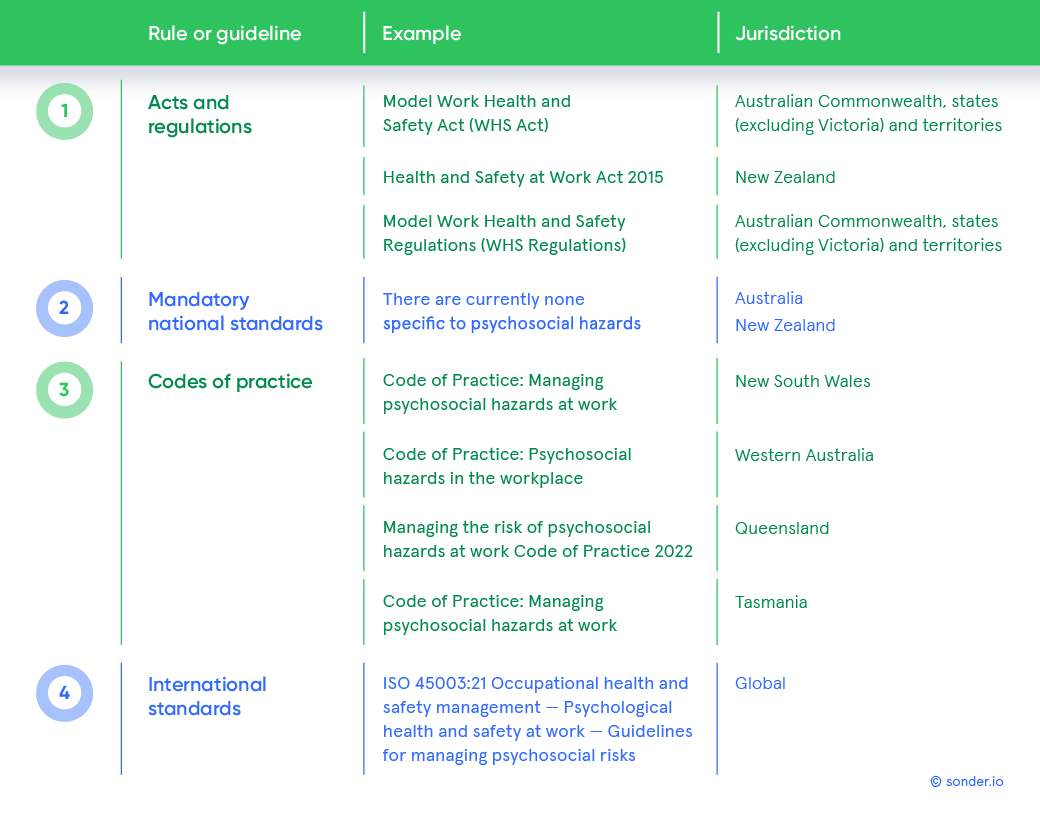
New/updated psychological health and safety rules
There have been several developments in 2022-23 in the legislation and guidance material in Australia relating to psychological health and safety, including:
Western Australia:
- The commencement of the Work Health and Safety Act 2020 on 31 March 2022.
- The commencement of the Code of Practice: Psychosocial hazards in the workplace on 11 February 2022.
Victoria:
- Occupational Health and Safety Amendment (Psychological Health) Regulations draft proposed. (Public comment closed March 2022. WorkSafe is now reviewing submissions received and promising to amend the proposed regulations where appropriate.) An explanation of the proposed changes can be found here.
Tasmania:
- The commencement of the Work Health and Safety Regulations 2022 that requires PCBUs to manage psychological health and prevent psychosocial hazards from 12 December 2022.
- The commencement of their Code of Practice: Managing psychosocial hazards at work from 4 January 2023.
Queensland:
- The commencement of their Managing the risk of psychosocial hazards at work Code of Practice 2022 from 1 April 2023.
Australia-wide:
- The changes to the Model WHS Regulations by Safe Work Australia to introduce psychosocial hazards (see more details here).
- The commencement of the amendment to the Work Health and Safety Regulations 2011 requiring PCBUs to implement control measures for psychosocial risks from 1 April 2023.
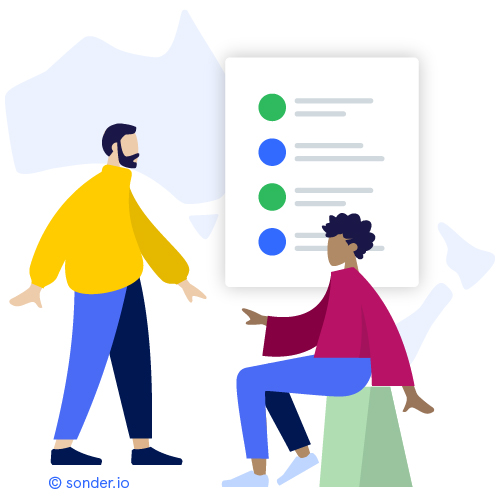
What’s the difference between psychological safety and psychological health and safety?
David Burroughs helps to clarify these definitions in this four-minute video. In short, he says that psychological safety is about interpersonal relationships, and psychological health and safety is about systems at work (and risk mitigation).
For further reading, see his article here.
Managing psychosocial risk in the workplace
Since ISO 45003 shone a spotlight on psychosocial risk, there have been many webinars helping organisations understand how to manage psychosocial risk in the workplace, but this webinar is one of the best.
Targeted at mature WHS/HR audiences rather than beginners, it brings together a collection of great expertise from the following speakers:
David Burroughs, Principal Psychologist, Australian Psychological Services
- Dave has had a 20-year international career as a psychologist and strategist who specialises in psychological risk management. He supports and advises leading organisations in their psychological health and safety activities and is also the Chief Mental Health Officer (CMHO) for Westpac Group.
Jane Bourke, Director – Safety, Health and Wellbeing, Woolworths Group
- Jane is a globally accomplished health and safety professional with extensive leadership experience working for several of Australia’s ASX top 20 companies and other global organisations with varying risk profiles.
Steve Bell, Managing Partner, EIRS at Herbert Smith Freehills
- A leading work health and safety (WHS) lawyer, Steve advises and represents businesses on all aspects of safety regulation. He is an expert in health and safety issues and workplace injury-related litigation.
Aaron Neilson CEO, The Safe Step and The Next Step
- Aaron is an expert in the search and selection of executive leadership and management positions within the work health and safety industry. He helps shape careers, deliver business impact, and influence broadly across the profession.
What’s the real benefit of a focus on psychological health and safety?
Steve Bell:
“There’s a real groundswell, I think, of a desire to improve the working life experience… so that’s our objective, is to find a better, kinder, more sustainable way of engaging with each other in the workforce, and being attuned to the things which have the potential to cause psychological harm.”
Will the new rules make a difference in the workplace in 2023?
Steve Bell:
“We’ve really accelerated from paying lip service to psychological health in work health and safety law, to a real acceleration on specific regulations dealing with this.
Is it going to make a difference? I’m not certain, to be honest. I think it’s going to draw a lot of attention to the topic. I think it’s going to improve our language and our ability to discuss psychosocial risk to a degree that’s more nuanced than we are today. It’s going to create a lot of paperwork.
It’s going to be good for psychologists, so I think you’re going to write lots of risk assessments. The challenge for business is, is doing all this for good, and not just doing it for compliance’s sake.”
Next steps for employers and WHS/HR practitioners
- Download our must-read guide to ISO 45003 here.
- If you’re a WHS/HR practitioner, read the full ISO 45003 document (here), and consider completing the 90-minute Foundations Course here, and the self-audit here.
- Gain executive support, because as the ISO states, “The success of psychosocial risk management depends on commitment from all levels and functions of the organisation, especially from top management”.
- Get started. “Start where you are at. Think about what you’d like to be different… Don’t delay starting to address psychological health and safety because you don’t have the ability to do it all. Just find something… There [are] lots of ways to start, but start.” – Mary Ann Baynton (Source), who was instrumental in crafting The National Standard of Canada for Psychological Health and Safety in the Workplace (2013).
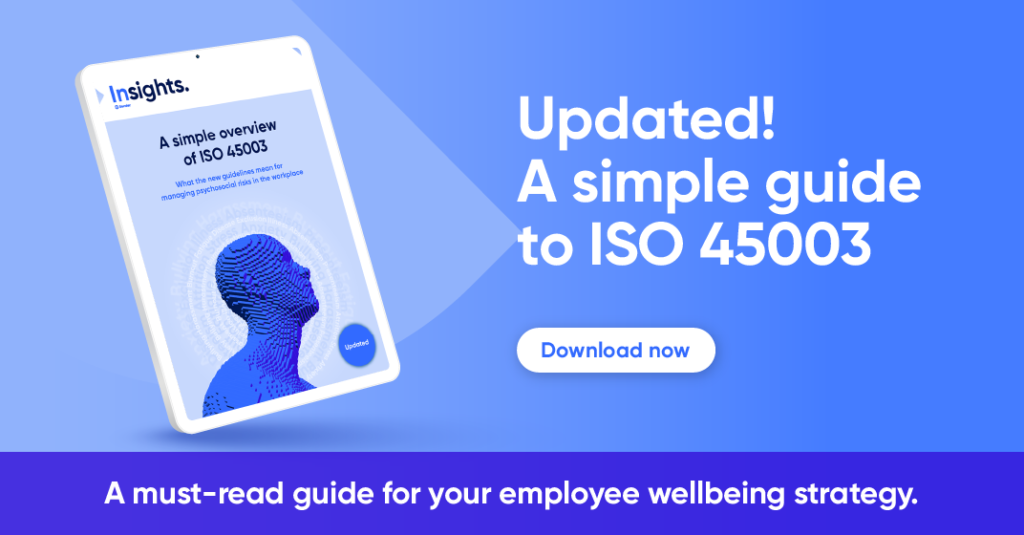
Want to learn more?
For more information on positive outcomes for employees and organisations, we invite you to read one of our original ISO 45003 blog posts: Why is ISO 45003 important?
For more information about how Sonder can help you rethink your student and/or employee support, we invite you to contact us here.
Disclaimer
This blog post covers legal and technical issues in a general way. (Parts of this post were prepared in conjunction with McCullough Robertson Lawyers.) It is not designed to express opinions on specific cases. The post is intended for information purposes only and should not be regarded as legal advice. Further advice should be obtained before taking action on any issue dealt with in this post.
About Sonder
Sonder is an Active Care technology company that helps organisations improve the wellbeing of their people so they perform at their best. Our mobile app provides immediate, 24/7 support from a team of safety, medical, and mental health professionals - plus onsite help for time-sensitive scenarios. Accredited by the Australian Council on Healthcare Standards (ACHS), our platform gives leaders the insights they need to act on tomorrow's wellbeing challenges today.
Related posts
There's so much more to share
Sonder is reimagining health, safety and wellbeing support. Sonder proves human centric care leads to earlier intervention. Sonder impacts one person at a time to drive meaningful change across an organisation. Sonder understands people and how to support them.



